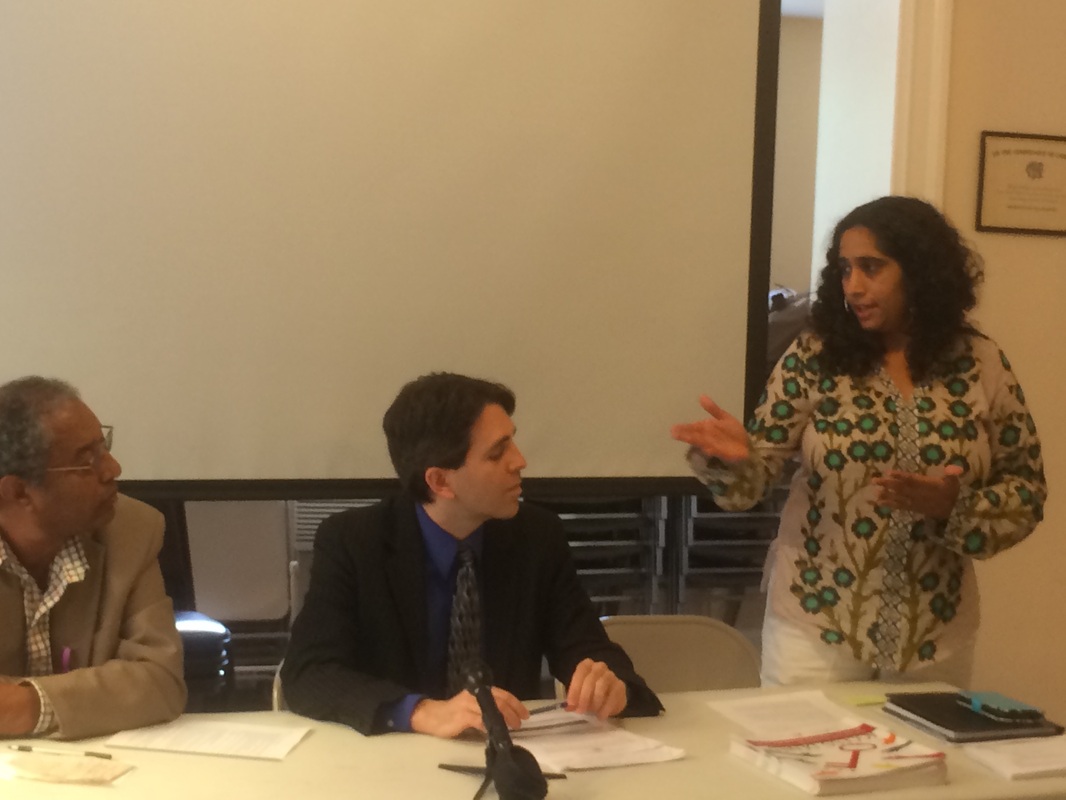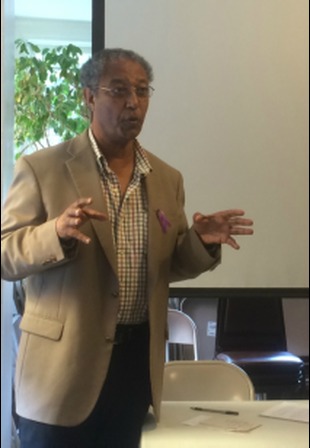|
Marking International Translation Day and the close of African Heritage Month, members of the DC Language Access Coalition announced major advancements to strengthen the Language Access Act at a Press Conference September 30th. While the event was organized to mark the creation of a pioneering Walk-Through Protocol for elected officials in the District, several last minute developments were celebrated as well, including the newly published Regulations to the DC Language Access Act and an amendment to the Language Access Act recently introduced by Councilmember Grosso. Protocol Ensures Language Access During Official Walk-Throughs The Walk-Through Protocol came about as a result of DCLAC’s advocacy, in partnership with community partners, for this new tool to ensure compliance with the DC Language Access Act. As David Steib, Language Access Director at Ayuda and member of the DCLAC's Legal Committee explained at the Press Conference, "the new Protocol provides guidelines for elected officials who plan to conduct Quick Response Walk-Throughs which would be triggered by a natural disaster or emergency situation or Planned Walk-Throughs in order to improve language access." He went on to explain how the Walk-Through Protocol is the result of a unique and successful community-government collaboration between the DC Language Access Coalition and many government representatives, including staff from the Office of Community Affairs in the Executive Office of the Mayor and from the Office of Human Rights. This Protocol dovetails with the DC Language Access Act of 2004, which requires that all DC government agencies, departments, and programs with public contact provide interpretation into any language spoken by the public. The DC Mayor, and other elected officials perform walk-throughs for such purposes as to enforce District regulations, to inform the public of new practices, to assess damage, or to conduct community outreach. In response to a reporter's question at the Press Conference today, Sapna Pandya, Executive Director of MLOV and a member of the DCLAC's Executive Committee shared that approximately 16% of DC residents are foreign-born and 1 in 20 are limited-English proficient or no-English proficient. She went on to say, however, "language access is not just for those who are limited English proficient, but also for monolingual English speakers. The intent of language access is to enable better communication between these individuals, so the monolingual English speaker needs language access as much as the immigrant who doesn't speak English as a primary language." Members of the DC Language Access Coalition reached out to government officials, initiating the development of the Protocol after television coverage of a walk-through in which a language barrier impeded communication between Mayor Gray and an African immigrant store clerk. That walk-through had been organized by the DC Department of Health (DOH) as part of its “K2 Zombie DC” campaign to address the prevalence of synthetic weed purchase and usage among District youth, which has severely harmful effects. This incident highlighted the importance of effective language access, as the language barrier hampered the spread of information about the dangers of this illegal substance, as well as about consequences for shopkeepers who are found in violation of the law. At least one third of small businesses in the District are either immigrant-owned or immigrant-run, and many of the staff that keep these businesses running do not speak English as a primary language. According to canvassing by Bekele Wolde, a member of the DC Language Access Coalition, in the same area of this incident, the Mayor and the “K2 Zombie DC” team conducted walk-throughs in 6 Ethiopian-owned or run businesses, yet no Amharic interpretation was provided, nor was the education flyer produced by the Department of Health translated into Amharic. In the months that followed, the Coalition and representatives from the Mayor's Office of Community Affairs, the Office of Human Rights and several other DC agencies worked together in a unique collaboration to address the issue of language access during walk-throughs by elected officials. The resulting Protocol, which will be an internal document used by District government and implemented by the Office of Community Affairs, is a product of this unique collaboration. "The creation of this Protocol serves as another reminder that when a community member raises their voice and knows their rights, with the help of advocates from the DC Language Access Coalition, big systemic change CAN happen." Under the new Protocol, the Mayor’s Office on Community Affairs (OCAF) will convene a team to conduct advance canvassing of any neighborhood where a planned walk-through will take place, to determine the need for language resources, and to evaluate the potential for engagement with limited-English proficient residents of the target neighborhood. The protocol aims to ensure optimal language access, encouraging the provision of in-person interpreters where possible, and providing instructions for utilizing telephonic interpretation as a backup. It also requires that officials translate vital documents associated with the planned walk-through (notices, letters, etc...) into identified language(s), and ensure that translations are made available at the same time and in the same way that documents in English are distributed (whether prior to or during the planned walk-through). DC Language Access Act Regulations Strengthen Language Rights Regulations to the DC Language Access Act were finalized and published to the Public Register on September 26th. These new ‘Regs’ incorporate many recommendations that the Coalition has been working diligently on submitting to the Office of Human Rights over the past 2 years, in order to strengthen the implementation of the Language Access Act. Some of the new changes, as reflected in the amended Regs include: · An Appeals Process for Language Access Complaints · A required Annual Implementation Report on language access for covered entities with major public contact · A mechanism to document "informal" reporting of language discrimination, to better track instances where language access rights have been denied but a formal complaint is not filed · Adding several more agencies to the list of covered entities with major public contact, including: -Department of General Services -Department of Health Care Finance; -Department of Small and Local Business Development; -Department of the Environment; -Department of Transportation; -Department of Youth Rehabilitation Services; -Department on Disability Services; -DC Lottery and Charitable Games Control Board; -District of Columbia Public Charter Schools; -Office of Administrative Hearings; -Office of the Attorney General-Child Support Services Division; -Office of the State Superintendent of Education; -Office of the Tenant Advocate; -Office of Unified Communications; and -Office of Zoning Councilmember Grosso Introduces Amendment to Strengthen the Language Access Act Councilmember Grosso introduced an amendment to the Language Access Act on September 23rd, which is an incredible development as it represents the first time a Council member has introduced amendments to the Language Access Act since its passage ten years ago. The DC Language Access Coalition has worked closely with Councilmember Grosso’s staff to develop this amendment in response to major language access issues across the District. The major provisions of the amendments are summarized in MLOV's blog: Read about proposed Amendments! At the press conference, Sapna Pandya, Executive Director of Many Languages One Voice and member of the Executive Committee of the DC Language Access Coalition discussed the amendment, explaining that hearings will most likely be held after new Councilmembers have been elected and Council returns after its winter recess. The Coalition is requesting the DC community to contact Councilmember Wells (D-Ward 6), Chair of the Committee on the Judiciary where the Language Access Act amendments were introduced, in order to request a hearing on the amendments be scheduled. Councilmember Wells can be reached at (202) 724-8072 or on [email protected]. Many Languages One Voice administers and coordinates the work of the DC Language Access Coalition, which consists of over 40 immigrant-serving organizations based throughout DC. The Coalition, realizing the importance of full access and participation for the District’s diverse populations, led the effort for the successful passage of the unique DC Language Access Act of 2004. Since then, the Coalition has provided direct consultation to DC government agencies on how to comply with this legislation and continues to advocate for even greater protections for DC residents. For more information about the DC Language Access Coalition, please email the Coalition's Organizer, Megan Walker at [email protected]. The Coalition encourages community members and advocates to come forward and share stories of discrimination based on the failure of DC government to provide language access as required by law.
0 Comments
Leave a Reply. |
Archives
March 2016
Language Access BlogLocal, national and global updates about language access news. Categories
All
|



 RSS Feed
RSS Feed
